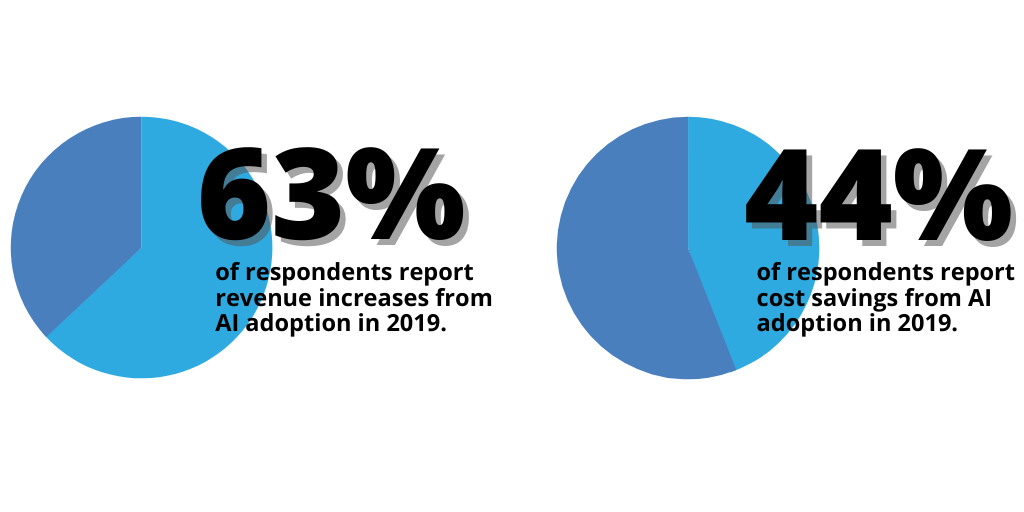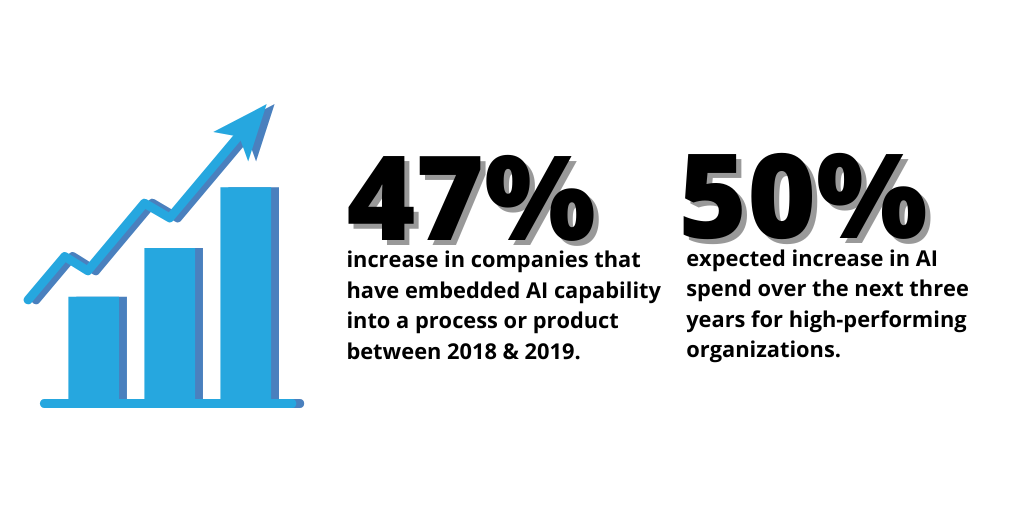Reviewing the projections and predictions that were fundamentally disrupted by global change.
~10 minute read
As we approach the last leg of 2020, it’s clear that world events have radically transformed the economic landscape before our eyes. Projections and predictions about the future of business made at the end of 2019 have been upended.
Companies ranging from massive global enterprises to local coffee shops have been forced to restructure and revise their strategies for a new era.
But change has always been the only consistent hallmark of our economy and the evolution of business is an inevitability.
This period of time is a catalyst that can unlock the potential for companies in all industries to drive incredible innovation forward and completely reimagine the way we do work.
Last year, the McKinsey Global AI Survey took stock of AI adoption in the enterprise. In light of our new global reality, the results from the survey speak to an even greater urgency for digital transformation and offer key insights into how AI will help companies adapt and thrive in the coming months and years.

Industry leaders are leveraging AI to increase revenue and cut costs
The McKinsey Global AI Survey reports that “respondents are most likely to report revenue growth from AI use cases in marketing and sales, and product and service development” while respondents in manufacturing and supply chain management realms were most likely to report significant cost savings as a result of AI adoption.
The results of the survey make it clear that AI is already being leveraged effectively to activate the value of the massive volume of data that businesses and their customers produce.
AI is being used at all levels and providing value across a range of simple-to-complex functions, expediting time-to-action on insights about everything from spend analytics, to customer service metrics and consumer behavior predictions, process optimization, and more.
In all of these instances, AI is leveraged to facilitate data-driven workflows that result in positive business outcomes; workflows that were otherwise highly labor, skill, and cost-intensive.
With processes like database access and analysis being facilitated by AI, humans are liberated to apply accurate, succinct information to their problem-solving methods on a daily basis, even if they’re not trained data scientists, data translators, or business analysts.
Read more: Today’s Leading Businesses Need Better Data Access Than Ever
Growth-focused businesses are motivated to close the technology gap to get ahead
A major theme in the survey results tells us about the widening gap between “high performers” and “laggards”: those that began adopting AI early, focused on retraining their teams, and found ways to scale their AI initiative(s) across multiple functions and business units versus those who haven’t yet invested significantly in technologies such as big data and advanced analytics or even cloud computing and mobile.
High performers are more likely to report both revenue increases and cost reductions, but the caveat is that they were already investing in other innovative technologies before considering AI.
This early-stage adoption of digital transformation initiatives gives them a leading-edge advantage over competitors still using legacy systems and struggling to upskill or reskill their teams on new technologies.
As we move into the future, companies need to close the technology gap if they hope to remain competitive. And, to excel in the era of digital transformation, companies need to focus on high-impact solutions that scale.
Read more: Driving Digital Transformation: Conversational AI for Next-Generation Data Access & Analytics
Software providers are poised to lead AI adoption and reap ROI, fast
The quicker that companies can catch up to today’s AI high performers or further enhance their successful AI initiatives, the more likely they are to emerge ahead of the pack, gain a competitive advantage, and effectively drive revenue and reduce costs.
With that in mind, software solution providers are key players in the race towards digital transformation and AI adoption.
While some companies choose to develop proprietary AI solutions, the boom in demand for adoptable AI solutions, or embeddable AI services, opens a window of opportunity for software developers to offer new functionality and new value in the solutions they’re already building.
Between 2018 and 2019, the McKinsey Global AI Survey reports a 47% uptick in embedded AI functionality among respondents. Furthermore, 74% of respondents whose companies have adopted or plan to adopt AI say their organizations will increase their AI investment in the next three years with 30% of high performers reporting that they will increase their AI investment by 50% or more within that time frame.
 This data represents a green light for software solution providers: leading businesses are putting in the work, and the capital, to bring AI to the forefront of business processes.
This data represents a green light for software solution providers: leading businesses are putting in the work, and the capital, to bring AI to the forefront of business processes.
As companies reassess where their time and money are allocated in the face of a shifting economy, decision makers are looking for solutions that make rapid AI adoption as achievable and impactful as possible.
McKinsey notes that “in product and service development, revenue-producing use cases include the creation of new AI-based products and new AI-based enhancements.”
This highlights a profound opportunity for today’s software providers: investing in AI-driven technology and implementing AI-driven features within existing solutions establishes competitive differentiation and can lead to significant revenue-generating opportunities.
To build on that: 31% of respondents in this category reported a revenue increase between 1-5%, 21% reported an increase between 6-10%, and 19% reported a revenue increase of greater than 10% in light of successful AI adoption internally, and through offering AI as part of their product or service offering.
Read more: 7 Reasons Data-Driven Businesses Need Conversational AI
Minimizing time-to-adoption puts software providers ahead of the curve
Business software developers also have a role to play in saving companies time and expense when it comes to upskilling their employees and cultivating a data-driven culture, from front-line staff to C-suite executives.
Even among the high performers, “only 36% of respondents from these companies say their front-line employees use AI insights in real time for daily decision making.”
It’s clear that one of the major problems companies are trying to solve is top-down adoption of AI to drive outcomes.
One of the ways software solution providers can enhance the value of their offering is by making AI functionality as intuitive and seamless as possible within their systems.
42% of respondents foresee retraining 50-100% of their workforce in the next three years in the face of AI adoption efforts.
The McKinsey Global AI Survey found that 83% of survey respondents expect at least some of their workforce to be retrained in the next three years because of AI adoption, and 38 percent expect more than a quarter to be retrained. 42% of respondents foresee retraining 50-100% of their workforce in the next three years in the face of AI adoption efforts.
Those numbers represent time, resources, and capital. Businesses will always want to find ways to reduce spend and increase ROI in these areas. With powerful AI-driven features embedded in the solutions they build, software providers can step up to the plate and offer easy-to-adopt AI-enabled functionality that doesn’t require extensive training and upskilling: a massive draw for decision makers across industries.
AI solutions that are easy to implement and adopt across multiple business functions will win out over complex solutions that require skilled professionals or significant time investments to implement. And, because the market is moving so quickly, these solutions also need to facilitate no (or low) learning-curve onboarding to support a workforce that is being required to become more agile and innovation-savvy by the day.
Learn more: Explore business use cases for conversational AI for database access
Taking the necessary next steps towards a new data-driven future
Leading businesses are looking to accelerate their digital transformation and AI initiatives, and business software providers can offer new value and grow their businesses by embedding AI in the solutions they already build.
An area of opportunity we see emerging from today’s data-saturated organizations is the need for better, faster, more intuitive access to the valuable insights and information every employee needs to make data-backed decisions that drive growth.
We believe conversational AI has the power to change the way businesses leverage their data by democratizing access to data and removing the time-and-skill-related barriers to finding and analyzing data.
In an evolving market, the ability to use data is crucial for business success.
For software solution providers, enabling simpler and more intuitive access to data within the systems they build will position them as leaders in a market that’s hungry for technological advancement and adoptable innovation that will enable them to thrive as we all adapt to this new economic landscape.

